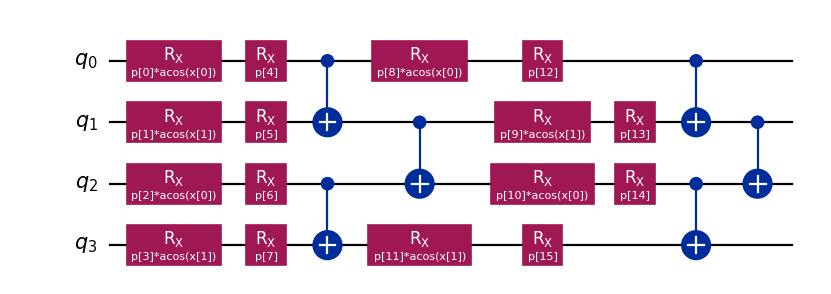squlearn.encoding_circuit.ChebyshevRx
- class squlearn.encoding_circuit.ChebyshevRx(num_qubits: int, num_layers: int = 1, num_features: int = None, closed: bool = False, alpha: float = 4.0, nonlinearity: str = 'arccos')
Simple Chebyshev encoding circuit build from Rx gates
Example for 4 qubits, a 2 dimensional feature vector and 2 layers:
(
Source code,png,hires.png,pdf)
- Parameters:
num_qubits (int) – Number of qubits of the ChebyshevRx encoding circuit
num_layers (int) – Number of layers (default: 1)
num_features (int) – Dimension of the feature vector (default: None)
closed (bool) – If true, the last and the first qubit are entangled (default: false)
alpha (float) – Maximum value of the Chebyshev Tower initial parameters, i.e. parameters that appear in the arccos encoding. (default: 4.0)
nonlinearity (str) – Mapping function to use for the feature encoding. Either
arccosorarctan(default:arccos)
- compose(x, concatenate_features=False, concatenate_parameters=False, num_circuit_features: Tuple[int, int] = (None, None))
Composition of encoding circuits with options for handling features and parameters
Number of qubits and features have to be equal in both encoding circuits! The special function and properties of the both encoding circuits are lost by this composition.
- Parameters:
self (EncodingCircuitBase) – right / first encoding circuit
x (EncodingCircuitBase) – left / second encoding circuit
concatenate_features (bool) – If True, the features of both encoding circuits are concatenated (default: False). If False, the features of both encoding circuits are taken
concatenate_parameters (bool) – If True, the parameters of both encoding circuits are concatenated (default: False). If False, the parameters of both encoding circuits are taken
num_circuit_features (Tuple[int, int]) – Tuple of the number of features for both encoding circuits. This has to be provided if concatenate_features is True otherwise an error is raised.
- Returns:
Returns the composed encoding circuit as special class ComposedEncodingCircuit
- draw(output: str = None, num_features: int = None, feature_label: str = 'x', parameter_label: str = 'p', decompose: bool = False, **kwargs) None
Draws the encoding circuit using the QuantumCircuit.draw() function.
- Parameters:
output (str) – Output format of the drawing (default: None).
num_features (int) – Number of features to draw the circuit with (default: None).
feature_label (str) – Label for the feature vector (default:”x”).
parameter_label (str) – Label for the parameter vector (default:”p”).
decompose (bool) – If True, the circuit is decomposed before printing (default: False).
kwargs – Additional arguments from Qiskit’s QuantumCircuit.draw() function.
- Raises:
ValueError – Raised if the number of features is not provided.
- Returns:
Returns the circuit in qiskit QuantumCircuit.draw() format
- generate_initial_parameters(num_features: int, seed: int | None = None) ndarray
Generates random parameters for the ChebyshevPQC encoding circuit
- Parameters:
num_features (int) – Number of features of the input data
seed (Union[int,None]) – Seed for the random number generator (default: None)
- Returns:
The randomly generated parameters
- get_cheb_indices(flatten: bool = True)
Function that returns the indices of the parameters involved in the Chebyshev encoding.
- Parameters:
flatten (bool) – If true, the indices are returned as a flat list, otherwise as a list of lists, where the outer list corresponds to the layers (default: True)
- get_circuit(features: ParameterVector | ndarray, parameters: ParameterVector | ndarray) QuantumCircuit
Returns the circuit of the ChebyshevRx encoding circuit
- Parameters:
Union[ParameterVector (param_vec) – Input vector of the features from which the gate inputs are obtained
np.ndarray] – Input vector of the features from which the gate inputs are obtained
Union[ParameterVector – Input vector of the parameters from which the gate inputs are obtained
np.ndarray] – Input vector of the parameters from which the gate inputs are obtained
- Returns:
Returns the circuit in Qiskit’s QuantumCircuit format
- get_feature_bounds(num_features: int) ndarray
Returns the feature bounds expanded for a given number of features.
- Parameters:
num_features (int) – Number of features to expand the bounds for.
- Returns:
Feature bounds expanded for the number of features.
- Return type:
np.ndarray
- get_params(deep: bool = True) dict
Returns hyper-parameters and their values of the ChebyshevRx encoding circuit
- Parameters:
deep (bool) – If True, also the parameters for contained objects are returned (default=True).
- Returns:
Dictionary with hyper-parameters and values.
- inverse()
Returns the inverse of the encoding circuit.
- Returns:
The inverse of the encoding circuit
- set_params(**kwargs) ChebyshevRx
Sets value of the encoding circuit hyper-parameters.
- Parameters:
params – Hyper-parameters and their values, e.g.
num_qubits=2.